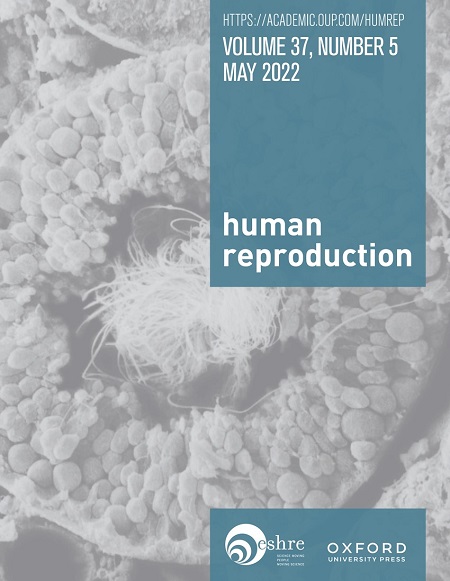Effect of maternal previous pregnancy on children’s pubertal development: an 8-year pubertal cohort
IF 6
1区 医学
Q1 OBSTETRICS & GYNECOLOGY
引用次数: 0
Abstract
STUDY QUESTION Does the maternal pregnancy history affect the course of their offspring’s pubertal development? SUMMARY ANSWER Maternal pregnancy history, particularly adverse outcomes, significantly influences the timing of menarche and the tempo of breast development in girls. WHAT IS KNOWN ALREADY Preliminary evidence indicates that parity may affect the onset of puberty, mainly as reflected by changes in the timing of pubic and axillary hair development. STUDY DESIGN, SIZE, DURATION This 8-year cohort, conducted semi-annually, was recruited from four primary schools. The average follow-up duration was 6.09 years (range: 2–8 years). PARTICIPANTS/MATERIALS, SETTING, METHODS The study cohort comprised 1390 children, including 710 girls and 680 boys, with age ranges of 6.58–19.26 years and 5.81–19.28 years, respectively, over an 8-year follow-up period. The primary exposure was whether the mother has a history of pregnancy prior to the birth of the child, including childbearing, miscarriage, and other adverse pregnancy outcomes. Pubertal milestones as assessed by a professional, including breast and genital development, were modeled using logistic regression, and the age of menarche was documented for girls. Associations between maternal pregnancy history and pubertal progression in both genders were analyzed using generalized linear regression models. MAIN RESULTS AND THE ROLE OF CHANCE Girls from non-first pregnancies experienced a delayed age at menarche by 0.22 years (95% CI: 0.05, 0.38) and a more rapid tempo of breast development (0.06; 95% CI: 0.01, 0.11) compared to those from first pregnancies, particularly among girls with a history of maternal adverse pregnancy outcomes. The effect of maternal pregnancy history on pubertal development was less pronounced in boys than in girls. LIMITATIONS, REASONS FOR CAUTION The sample was relatively small, and the cohort also lacks sufficient data due to missing data points and some study participants still maturing. While model fitting aids in describing incomplete pubertal development, the logistic growth mixed-effects model’s assumptions about growth curves may not fully reflect reality. WIDER IMPLICATIONS OF THE FINDINGS Maternal pregnancy history, particularly adverse outcomes, can markedly influence pubertal progression in girls. Previous studies have shown that the timing and tempo of pubertal development impact adolescent psychological and behavioral health, and have implications for reproductive health and diseases in adulthood. Optimal pregnancy planning by mothers is essential for enhancing the well-being of both mother and offspring. STUDY FUNDING/COMPETING INTEREST(S) This work was supported by Chongqing Natural Science Foundation project (CSTB2023NSCQ-MSX0133), National Natural Science Foundation of China (81973067), National Youth Science Fund Project (81502825), and Program for Youth Innovation in Future Medicine, Chongqing Medical University (W0054). This study was conducted according to the guidelines of the Declaration of Helsinki, and approved by the Ethics Committee of Chongqing Medical University (Reference Number: 2023003). Informed consent was obtained from all participants and their guardians involved in the study. The authors declared that they have no conflicts of interest to disclose. TRIAL REGISTRATION NUMBER N/A.母亲既往妊娠对儿童青春期发育的影响:一项8年的青春期队列研究
研究问题:母亲的怀孕史是否会影响其后代的青春期发育?母体妊娠史,尤其是不良后果,显著影响女孩月经初潮的时间和乳房发育的速度。初步证据表明,胎次可能影响青春期的开始,这主要反映在阴毛和腋毛发育时间的变化上。研究设计、规模、持续时间本研究从四所小学招募,为期8年,每半年进行一次。平均随访时间为6.09年(2 ~ 8年)。参与者/材料、环境、方法研究队列包括1390名儿童,其中女孩710名,男孩680名,年龄分别为6.58-19.26岁和5.81-19.28岁,随访8年。主要暴露是母亲在孩子出生前是否有妊娠史,包括生育、流产和其他不良妊娠结局。由专业人士评估的青春期里程碑,包括乳房和生殖器发育,使用逻辑回归建模,并记录了女孩的月经初潮年龄。使用广义线性回归模型分析了孕产妇妊娠史与两性青春期发展之间的关系。非第一次怀孕的女孩月经初潮年龄延迟0.22年(95% CI: 0.05, 0.38),乳房发育速度更快(0.06;95% CI: 0.01, 0.11),与第一次怀孕相比,特别是在有孕产妇不良妊娠结局史的女孩中。母亲怀孕史对男孩青春期发育的影响不如女孩明显。本研究样本量相对较小,由于缺少数据点和一些研究参与者尚处于成熟阶段,该队列也缺乏足够的数据。虽然模型拟合有助于描述青春期发育不完全,但logistic生长混合效应模型对生长曲线的假设可能不能完全反映现实。研究结果的更广泛含义:母亲的妊娠史,特别是不良后果,可以显著影响女孩的青春期发育。以往的研究表明,青春期发育的时间和速度影响青少年的心理和行为健康,并对成年后的生殖健康和疾病有影响。母亲的最佳怀孕计划对于提高母亲和后代的福祉至关重要。重庆市自然科学基金项目(CSTB2023NSCQ-MSX0133)、国家自然科学基金项目(81973067)、国家青年科学基金项目(81502825)和重庆医科大学未来医学青年创新计划(W0054)资助。本研究按照《赫尔辛基宣言》的指导原则进行,并经重庆医科大学伦理委员会批准(参考文献号:2023003)。所有参与研究的参与者及其监护人均已取得知情同意。作者宣称他们没有任何利益冲突要披露。试验注册号n / a。
本文章由计算机程序翻译,如有差异,请以英文原文为准。
求助全文
约1分钟内获得全文
求助全文
来源期刊

Human reproduction
医学-妇产科学
CiteScore
10.90
自引率
6.60%
发文量
1369
审稿时长
1 months
期刊介绍:
Human Reproduction features full-length, peer-reviewed papers reporting original research, concise clinical case reports, as well as opinions and debates on topical issues.
Papers published cover the clinical science and medical aspects of reproductive physiology, pathology and endocrinology; including andrology, gonad function, gametogenesis, fertilization, embryo development, implantation, early pregnancy, genetics, genetic diagnosis, oncology, infectious disease, surgery, contraception, infertility treatment, psychology, ethics and social issues.
 求助内容:
求助内容: 应助结果提醒方式:
应助结果提醒方式:


